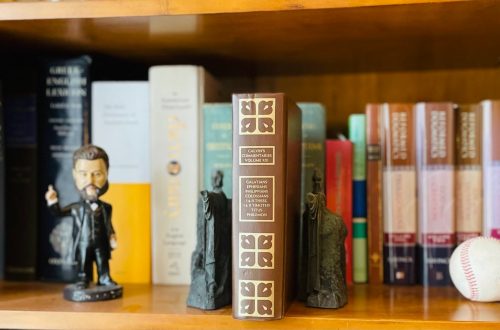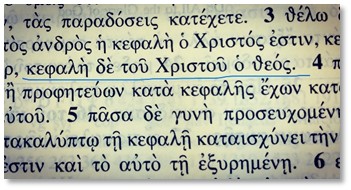
I used to do the strangest thing during church services when I was a kid growing up in my home church of DeRidder, Louisiana. I made a regular habit of taking out the pew Bible during the sermon and reading the Old Testament stories that I thought were “cool.†I was fascinated by the biblical stories and their often stark portrayals of war, violence, and intrigue. I can remember reading about Amnon’s treachery against his half-sister Tamar (2 Samuel 13) and the 200 Philistine foreskins that David paid Saul so that he could become the king’s son-in-law (1 Samuel 18). Stories like these became my friends when I couldn’t get my little preteen brain to focus on the preacher’s sermon.
A conversation today with Dr. Russell D. Moore, guest lecturer at the Criswell College, reminded me of my childhood fascination with these stories. Dr. Moore explained how he thought the evangelical church in America tends to water down the blood and guts of the biblical story line. It’s not just the Veggie Tales who have transformed the blood-thirsty Ninevites into cute little creatures whose only sin is to slap each other around with cute little fish, but this kind of non-violent biblical revisionism happens every Sunday morning in children’s Sunday school classes in conservative churches all across America. As a result, most young boys grow up envisioning Jesus not as the warrior-King of the Gospels, but as the feminine looking “bearded lady†of the flannel graph. Dr. Moore argued that this trend reflects a feminization of the biblical story line that ultimately causes young boys to lose interest in the Gospel.
Dr. Moore has written a short essay on this topic titled, “Children’s Sunday School and the Battle for the Bible.†Dr. Moore is one of my favorite writers, and I regularly read his blog at http://www.henryinstitute.com/. Visit the website. Read it often. I’m certain he’ll become one of your favorites too.
“Children’s Sunday School and the Battle for the Bible” – by Dr. Russell D. Moore
Dr. Russell D. Moore is the Dean of Theology and Senior Vice President for Academic Administration at The Southern Baptist Theological Seminary, in Louisville, Kentucky. He also serves as executive director of The Henry Institute, a think-tank named after Carl F. H. Henry that is devoted to equipping churches and church leaders to engage the culture from a biblical worldview perspective.




3 Comments
Jen
Just some tangential anecdotal evidence. . . .
I’m currently teaching an undergraduate creative writing class at a Southern liberal arts college, and I lately gave a poem assignment I call “Old Testament, New Enjambment” that requires students to write from an OT story and play with line breaks. When I first gave this assignment four years ago, I assumed the poems from my Bible-belt educated students would reflect a wide range of OT texts. Couldn’t have been more wrong: the nearly 50 assignments I’ve received over these years have lamely attempted the 10 Commandments, the Egyptian plagues, and Noah’s Ark more times than I care to count. As if there isn’t more to it than that.
Then if someone dares choose the story of Ehud or the Levite and his concubine, the other students have no clue such stuff ever graced the pages of the Bible. Now, these are not all students with evangelical backgrounds, which makes the evidence indeed tangential to Moore’s observations. And they’re not necessarily churched at all, which requires a different thesis altogether. But still, the point remains: biblical illiteracy in our culture is astounding.
(Perhaps my students’ apathy is even more astounding? On the workshop list I always note the biblical references for the chosen poems and explicitly ask the students to read those original passages before class, but few do, because they figure their vague recollections from watery Sunday School lessons will do. Last week when I requested comment from one student she even had the gall to say “I’m a Sunday School dropout” as though that justified both her ignorance and disrespect.)
So, bring on the blood and guts. Let’s just have reality. How will we really know God if we categorically ignore the hard truth about His paradoxically simultaneous goodness and wrath, mercy and justice, and all the rest with their sometimes frightening real consequences? Too, the Bible, like all other good literature, shows us the human heart as it really is: deceitfully wicked beyond all things, and messy if you cut into it.
nathaniel adam king
very good…
jowiki
thank you for letting us know about moores blog i was curious to know if he had one.
josh